Help desk tools are software solutions designed to manage and streamline customer support operations as centralized platforms for support agents to handle customer issues. The top help desk tools usually offer robust ticketing systems, multi-channel support, AI and automation capabilities, and SLA management, alongside intuitive user interfaces. We’ve evaluated several options based on a set of criteria to help you identify the best tool for you.
Here are the six best help desk tools for MSPs:
- Zoho Desk: Best overall tool for pricing, core features, and support (15-day free trial)
- LiveAgent: Best help desk software option for intuitive setup and use (30-day free trial)
- ManageEngine ServiceDesk Plus: Best for reporting and dashboards (30-day free trial)
- SolarWinds: Best help desk software for flexible and upfront pricing (30-day free trial)
- Freshdesk: Best software option for core and advanced features (14-day free trial)
- Intercom: Best help desk software to provide AI-enhanced support (14-day free trial)
Although some help desk tools ranked highly in various categories, overall, Zoho Desk stood out as the tool that delivers the best overall value for those looking for a thorough, well-balanced help desk solution. Keep reading to check out what each software tool offers across main use cases, capabilities, and cost, or jump down to see how we evaluated each software.
Note: All per-user prices are based on a one-year commitment unless otherwise noted.
Zoho Desk: Best Overall Help Desk Tool

Presents the best combination of cost, core capabilities, and help desk customer support.
Price Range: Free to $40 per user, per month (15-day free trial)
Overall Rating: 4.4/5
- Core Features: 4.4/5
- Cost: 4.6/5
- Customer Support: 4.5/5
- Ease of Use: 3.6/5
- Customization: 4.9/5
- Integration & Compatibility: 4.9/5
| Pros | Cons |
|---|---|
| Vast support features | No desktop app |
| Many integration options | Has learning curve |
| User-friendly interface | Basic reporting |
Zoho Desk, our selection of the best overall software tool, is help desk software created to be the single point of contact for managing customer support activities. It offers affordable pricing plans, great customizability, and a solid set of core features like ticketing, automation, and multi-channel support, as well as thorough customer support options for help desk teams. Zoho Desk also gives users a healthy variety of integration options.
Although Zoho Desk is highly integrable and offers MSPs great customer support, it’s not the most intuitive tool. For a tool that’s easier to use, consider SolarWinds.
Zoho Desk Pricing
- Free Version: Supports up to 3 users
- Standard Plan: $14 per user, per month
- Professional Plan: $23 per user, per month
- Enterprise Plan: $40 per user, per month
- Free Trial: 15 days
Zoho Desk Key Features
- Multi-Channel Support: Manage your support tickets from email, chat, phone, and social media in one dashboard.
- Advanced Response Editor: Tailor your responses to suit various situations according to customer needs.
- Team Collaboration: Help your support teams collaborate on tickets faster using features like instant messaging.
- Security: Use roles and profiles to protect customer data while giving your teams the information they need.
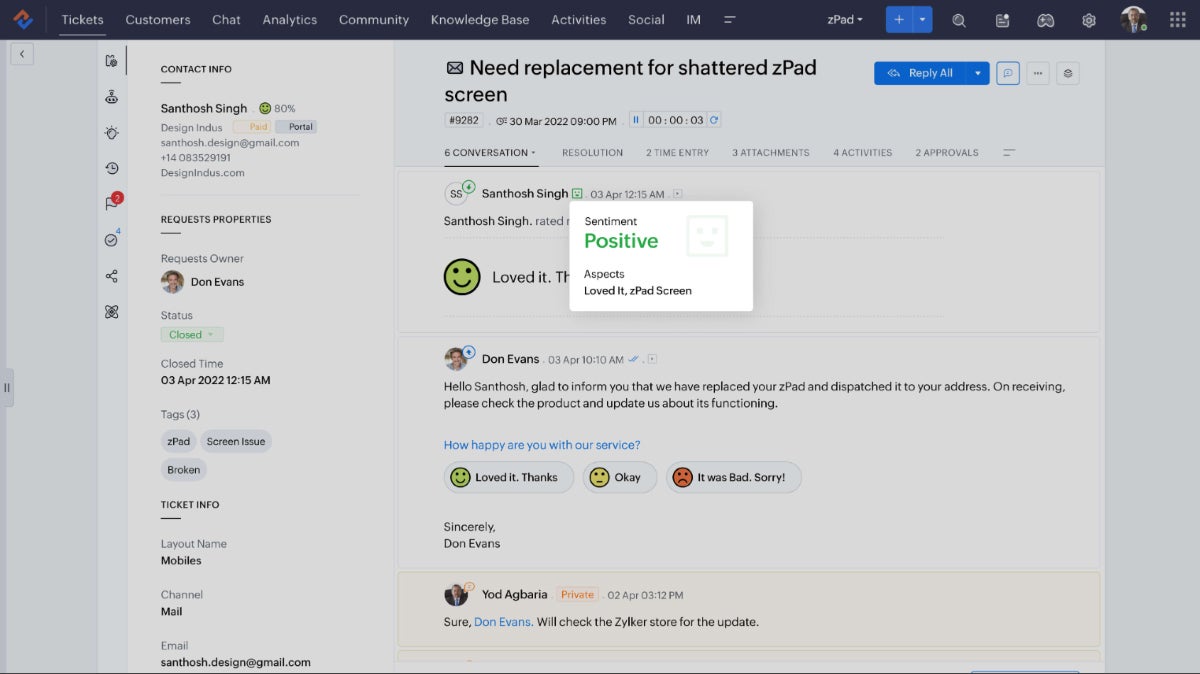
LiveAgent: Best for Intuitive Setup & Use

Delivers a user-friendly tool with extensive customization possibilities.
Price Range: Free to $ 69 per user, per month (30-day free trial)
Overall Rating: 4.3/5
- Core Features: 4.2/5
- Cost: 4.3/5
- Customer Support: 3.7/5
- Ease of Use: 4.6/5
- Customization: 5/5
- Integration & Compatibility: 4.5/5
| Pros | Cons |
|---|---|
| Intuitive interface | UI needs revamping |
| Easy to use and set up | EU-based tech support |
| Vast pricing options | Limited mobile app |
LiveAgent is a help desk software solution that offers a blend of extensive customization options with a high degree of intuitiveness and user-friendly interfaces. It’s easy to deploy, allowing support agents to get up and running quickly and better focus more on client issues. This intuitiveness is shown by a feature like proactive chat invitations, which only invites visitors to chat when there are enough agents ready to engage in conversation.
As much as LiveAgent is highly intuitive, its customer support has room for improvement, particularly since its tech support is based in the EU. For a solution that’s easy to use and offers great customizability and customer support, shortlist ManageEngine ServiceDesk Plus.
LiveAgent Pricing
- Free: Up to 7 days of ticket history
- Small Business: $9 per user, per month
- Medium Business: $29 per user, per month
- Large Business: $49 per user, per month
- Enterprise: $69 per user, per month
- Free Trial: 30 days
LiveAgent Key Features
- Live Chat: Use real-time chat widgets to provide support for website visitors and customers.
- Ticketing: Gather and manage communications from all channels to resolve customer queries.
- Performance Analytics: Measure data to track agent performance and customer satisfaction.
- Mobile Application: Handle customer requests on the go using Android and iOS applications.
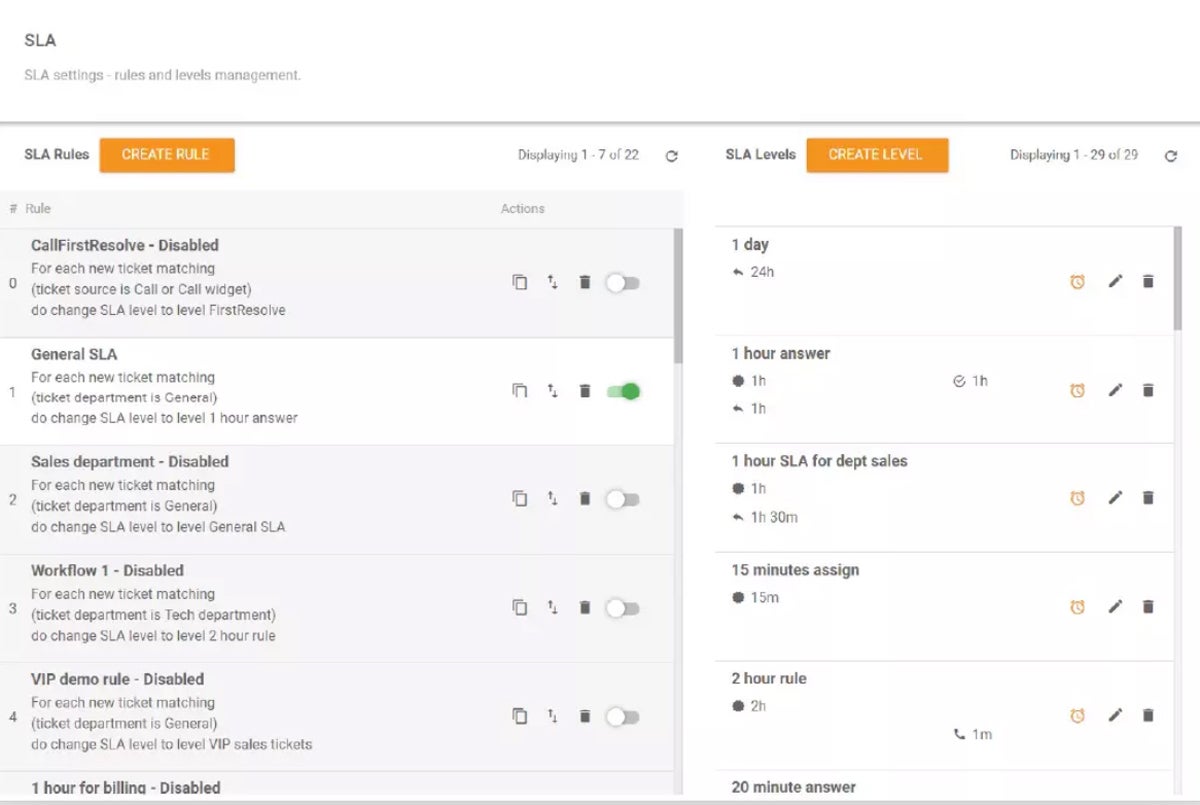
ManageEngine ServiceDesk Plus: Best for Reporting & Dashboards

An all-in-one solution with robust service desk reporting capabilities.
Price Range: $10 to $50 per user, per month (30-day free trial)
Overall Rating: 4.3/5
- Core Features: 4.2/5
- Cost: 4.5/5
- Customer Support: 4.2/5
- Ease of Use: 4/5
- Customization: 4.8/5
- Integration & Compatibility: 4.3
| Pros | Cons |
|---|---|
| Cost-effective tool | Complex setup |
| Strong asset management features | Limited customer support |
| Highly scalable solution | Higher learning curve |
ManageEngine ServiceDesk Plus is an all-in-one service desk solution whose customizable reports and dashboards help enterprise users track their help desks’ health. Its native reports deliver data-driven insights to MSPs. ServiceDesk’s inventory reports build custom, query, and pre-configured reports for tracking metrics. It also offers interactive dashboards that enable users to create custom reports and display data from multiple reports in one place.
Even though ManageEngine is a thorough, highly customizable, and transparently priced solution, it’s not the easiest to use. For a solution that delivers a similar experience while proving to be easy to use, consider Freshdesk.
ManageEngine ServiceDesk Plus Pricing
- Standard: $10 per user, per month
- Professional: $25 per user, per month
- Enterprise: $50 per user, per month
- Free Trial: 30 days
ManageEngine ServiceDesk Plus Key Features
- Customizations: Create a service desk whose attributes and processes meet your objectives.
- Asset Management: Discover, manage, and track your hardware and software assets.
- Efficient Automations: Automate repetitive tasks and processes for your service desk teams.
- Reporting and Dashboards: Keep an eye on your service desk health using native reporting.

SolarWinds: Best Software for Flexible & Upfront Pricing

Provides a product with clear, flexible, and scalable pricing.
Price Range: $39 to $99 per user, per month (30-day free trial)
Overall Rating: 4.2/5
- Core Features: 4.4/5
- Cost: 5/5
- Customer Support: 4.4/5
- Ease of Use: 4.3/5
- Customization: 2.7/5
- Integration & Compatibility: 4/5
| Pros | Cons |
|---|---|
| Transparent pricing | Could be easier to use |
| Highly scalable | Limited customizability |
| Robust security features | Setup can feel complex |
SolarWinds ServiceDesk is a cloud-based service desk solution with a variety of automation features for maximizing productivity, alongside transparent and flexible pricing. Although many tools on this list have additional fees, SolarWinds ServiceDesk’s pricing structure is clear as its prices are laid out upfront with no hidden fees, allowing businesses to easily understand what they’re paying for and why. This makes budgeting simpler and more predictable for MSPs.
As transparently priced as it is, SolarWinds ServiceDesk’s customization options have room for improvement. Consider Zoho Desk if you seek a higher degree of customizability.
SolarWinds Pricing
- Essentials Plan: $39 per user, per month
- Advanced Plan: $79 per user, per month
- Premier Plan: $99 per user, per month
- Free Trial: 30 days
SolarWinds Key Features
- Automated Ticketing: Automate ticket classification, routing, and correlation capabilities.
- Automated Workflows: Streamline ticket resolution with automated processes.
- Dashboards: Observe the current state of your service desk through ServiceDesk’s real-time snapshots.
- Customizable Reports: Generate custom reports based on your service desk team’s needs.
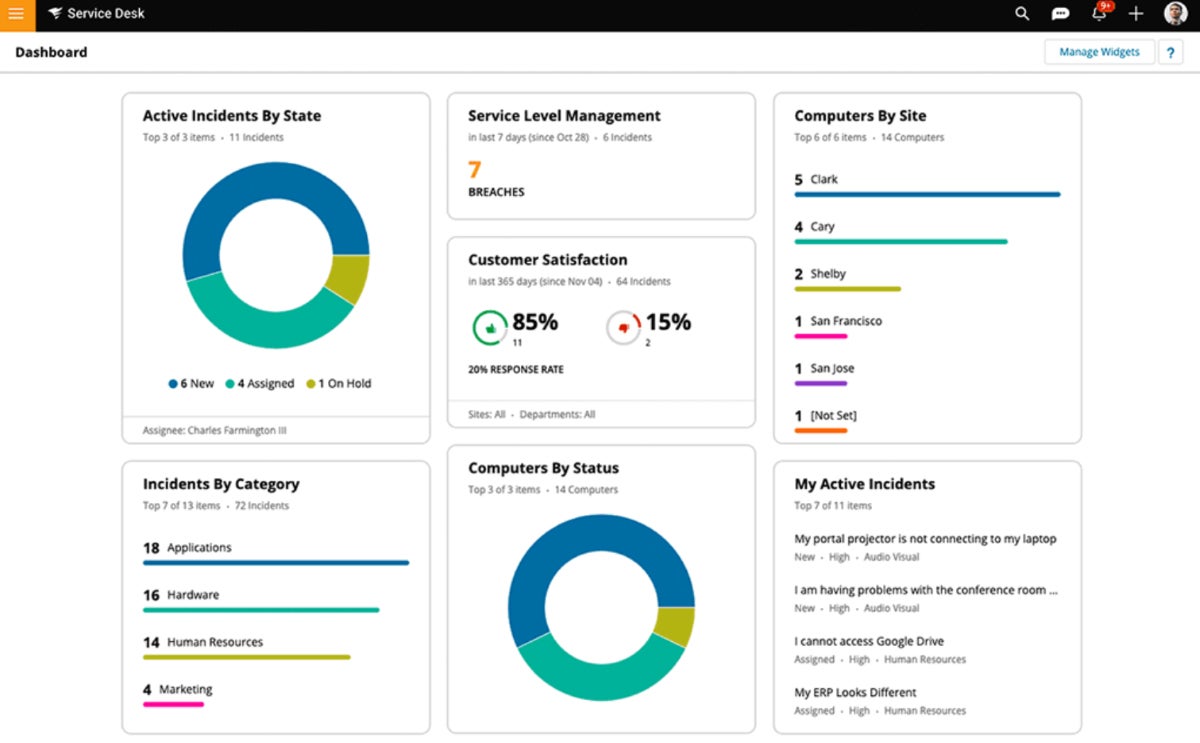
Freshdesk: Best for Core & Advanced Features

Delivers a wide roster of features that’re most useful to MSPs.
Price Range: Free to $79 per user, per month (14-day free trial)
Overall Rating: 4.1/5
- Core Features: 4.4/5
- Cost: 4.1/5
- Customer Support: 3/5
- Ease of Use: 4.3/5
- Customization: 4.9/5
- Integration & Compatibility: 3/5
| Pros | Cons |
|---|---|
| Very customizable tool | Limited integrations |
| Strong ticketing system | Not the easiest to use |
| Robust reports | No 24/7 support |
Freshdesk is cloud-based help desk software that offers a comprehensive catalog of help desk features suitable for businesses of all sizes. It shines through its range of features like integrated ticketing, 24/7 email support, and knowledge base, available in its free tier. But you’d have to upgrade to paid plans for features like automation, custom roles, objects and dashboards, customer journeys, community forums, and extendable API limits.
However, Freshdesk is neither as integrable nor as compatible as some tools on this list. For a tool with an extensive feature set and high customization with more integration options, check out Zoho Desk.
Freshdesk Pricing
- Free Version: Supports up to 10 agents
- Growth Plan: $15 per user, per month
- Pro Plan: $49 per user, per month
- Enterprise Plan: $79 per user, per month
- Free Trial: 14 days
Freshdesk Key Features
- Ticket Field Suggester: Automatically propose ticket fields to segment, prioritize, and route incoming tickets.
- Omnichannel Support: Manage and unify support through email, chat, and social media on one platform.
- Chatbot: Use a chatbot powered by Freddy AI to provide instant and accurate responses to customers.
- Portal Customization: Leverage full CSS customization to tailor the look of your support portal.
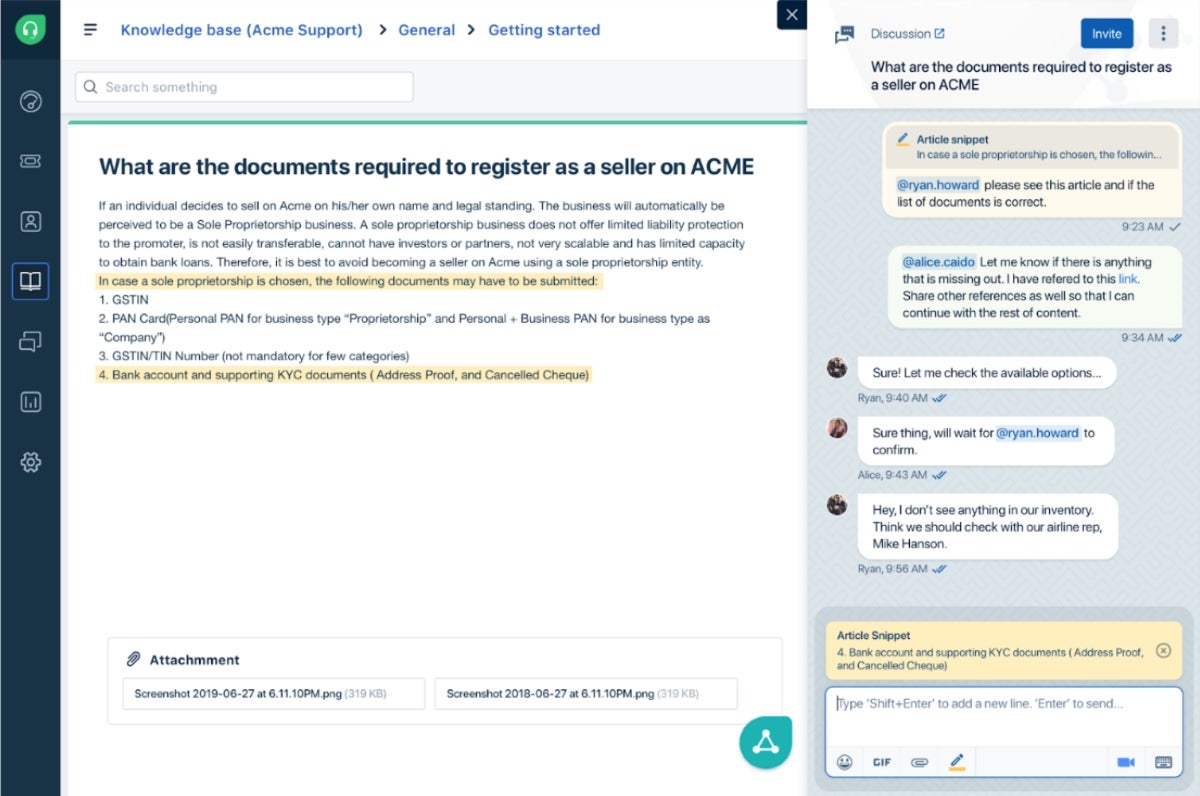
Intercom: Best to Provide AI-Enhanced Support

Combines an AI chatbot with proactive support to improve help desk team productivity.
Price Range: From $74 per month (14-day free trial)
Overall Rating: 4/5
- Core Features: 4.2/5
- Cost: 4.1/5
- Customer Support: 3.3/5
- Ease of Use: 3.9/5
- Customization: 4.1/5
- Integration & Compatibility: 4.2/5
| Pros | Cons |
|---|---|
| Advanced AI features | Expensive pricing model |
| Real-time chat support | Limited reporting features |
| Highly integrable | Has a learning curve |
Intercom is a help desk platform that enables MSPs to leverage AI-enhanced support capabilities so that their support teams work and collaborate more efficiently. It does this through features like automated customer engagement, real-time chat support, and targeted communication. Its AI-driven chatbots in particular stand out as they can handle tasks like answering frequently asked questions and routing issues to the appropriate support agents, which results in elevating the overall user experience of both customers and service teams.
All its AI capabilities aside, Intercom’s customer service isn’t as highly rated as some other tools on this list. For a platform that offers better customer service, check out SolarWinds ServiceDesk, which has an AI-powered virtual agent to support troubleshooting.
Intercom Pricing
- Starter: $74 per month
- Pro: Contact for quote
- Premium: Contact for quote
- Free Trial: 14 days
Intercom Key Features
- AI Bots: Leverage AI-powered chatbots to automate your initial customer interactions.
- Omnichannel Support: Access channels like live chat, WhatsApp, phone, and email via Intercom’s inbox.
- Workflows: Use Intercom’s visual builder to automate team workloads with bots, SLAs, and more.
- No-code Customization: Use customization tools in one workspace to manage many help centers.
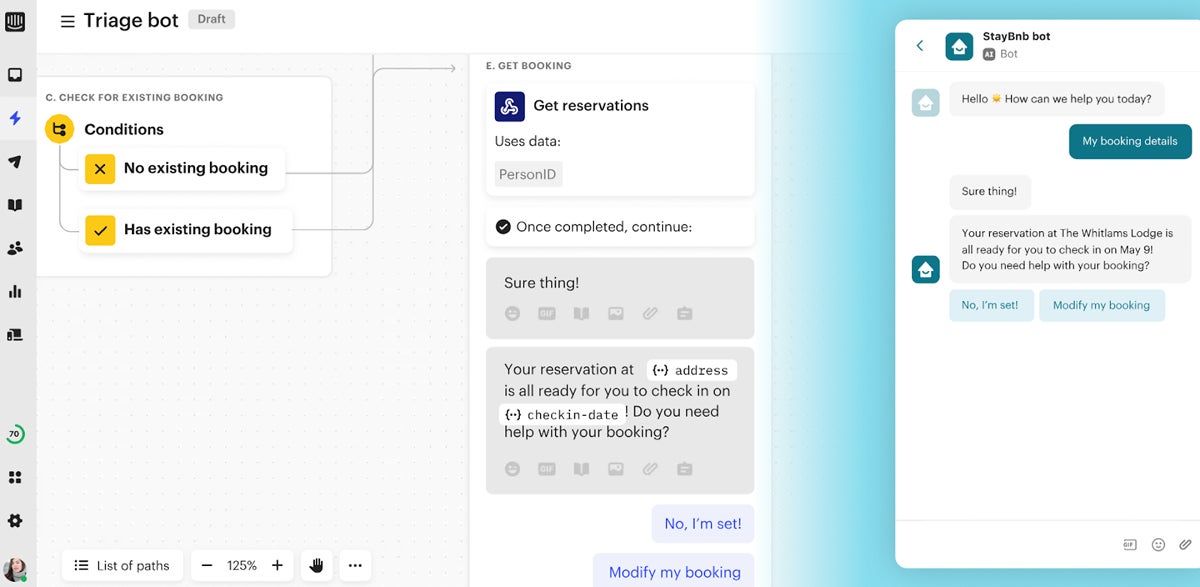
Top 4 Help Desk Features
Some of the most important features of help desk tools for MSPs include:
- Ticket Management: Streamline customer support interactions and keep track of tickets to investigate, solve, and prevent issues.
- Multi-Channel Support: Manage queries from multiple platforms to engage with your customer base on as many channels as possible.
- Automation: Automate repetitive customer support tasks to improve the productivity of your help desk teams and reduce response times.
- Intuitive User Interface: Enable your support teams to have an easy experience with typically feature-rich help desk software.
How We Evaluated the Best Help Desk Tools
To determine the best help desk software for MSPs, we evaluated several help desk tools using six weighted scoring categories, where each category had a maximum of five points. The tool with the highest score out of five won that particular category. We then assigned primary use cases to the six tools with the highest scores. Out of the top six, the tool with the highest average score across the six categories became our winner.
Evaluation Criteria
The primary features of help desk software determine how easy it’ll be for support teams and end users to interact with each other, so we gave the core features the highest weight. We followed this with cost as the software tool needs to be affordable for your use case. After considering cost, we evaluated customer support, ease of use, and customization, which we weighted equally. Finally, we considered the integration and compatibility of the tools.
- Core Features (25%): For this, we analyzed the key features of help desk tools, including ticket management, automation, reporting, and more.
- Criteria Winner: Freshdesk
- Cost (20%): We paid attention to the pricing models, free trials, additional costs, and pricing transparency to understand the financial commitment involved.
- Criteria Winner: SolarWinds
- Customer Support (15%): We took stock of the support channels, their availability, and the quality of service to gauge how well you’d find help in times of need.
- Criteria Winner: Zoho Desk
- Ease of Use (15%): The bulk of assessments here were based on how the overall user experience was rated by verified users.
- Criteria Winner: LiveAgent
- Customization (15%): We evaluated the extent to which each tool allows for personalization, from custom fields and statuses to branding elements.
- Criteria Winner: LiveAgent
- Integration & Compatibility (10%): Lastly, we considered how each tool integrates with other software solutions and its adaptability across various platforms.
- Criteria Winner: Zoho Desk
Frequently Asked Questions (FAQ)
What Features Should MSPs Look for in Help Desk Tools for Effective Client Support?
MSPs should prioritize features like multi-channel ticketing, automated workflows, and robust reporting capabilities. These functionalities enable MSPs to manage client issues efficiently, automate repetitive tasks, and gain insights into performance metrics, thereby enhancing client support.
Can Help Desk Tools for MSPs Handle Multiple Clients & Diverse IT Environments?
Advanced help desk tools are designed to manage multiple clients and adapt to diverse IT environments. They often come with features like client segmentation, asset tracking, and multi-tenancy, allowing MSPs to provide tailored services to each client while maintaining a unified dashboard.
How Can Help Desk Tools Improve Client Satisfaction for MSPs?
Help desk tools can significantly improve client satisfaction by streamlining communication and speeding up issue resolution. Features like live chat, self-service portals, and AI-driven support can provide clients with immediate assistance, while analytics tools can help MSPs identify areas for improvement.
Bottom Line: Best Help Desk Tools
The best help desk tools typically offer ticket management, support over multiple channels, and increasing levels of AI automation we’re experiencing today. We’ve explored how each tool approaches such features and what each software brings to the table. However, if you’re looking for a more general assortment of MSP tools, read our best MSP software article, which includes all the tools you’ll need to optimize various aspects of your MSP business.

